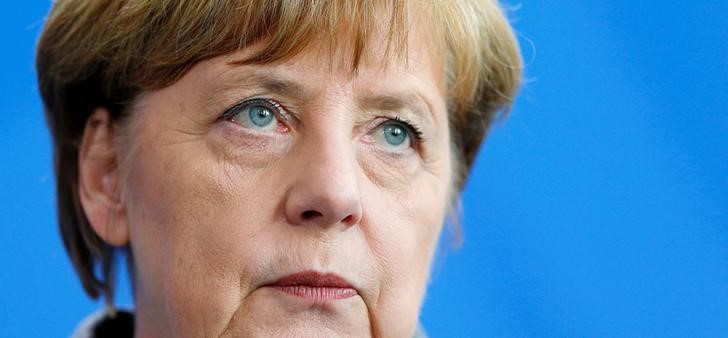Street Calls of the Week
(Bloomberg) -- Talks on forming German Chancellor Angela Merkel’s next government collapsed, throwing the future of Europe’s longest-serving leader into doubt and potentially pointing the world’s fourth-biggest economy toward new elections.
A 12-hour negotiating session ended shortly before midnight Sunday with the pro-market Free Democratic Party walking out of the exploratory talks, saying that differences with the environmentalist Green party were too great to bridge. The euro fell.
After 12 years in office that have made her Europe’s anchor of stability in times of crisis, Merkel failed to stitch together an alliance that’s never been tried at the national level. While the breakdown leaves her in charge as acting chancellor, the collapse may signal the limit of her pragmatic, non-ideological style of governing and leaves her options for staying in power for another four years dramatically narrowed.
“It’s better not to govern than to govern badly,” FDP head Christian Lindner told reporters in Berlin after Merkel tried for a month to enlist the two smaller parties for her fourth-term coalition.
Eric Schweitzer, head of Germany’s DIHK chamber of industry and commerce, expressed disappoinment. ‘‘A chance has been missed to go beyond ideological boundaries and agree realistic solutions,” Schweitzer was quoted as saying by Deutsche Presse-Agentur. “But the DIHK is confident that all responsible parties will ultimately be capable of finding sensible compromises.”
Uncharted Territory
Possibilities include setting up a minority government headed by her Christian Democratic-led bloc or asking Germany’s president to order a national election just months after the last one in September. Both scenarios would be uncharted territory for Germany, which has had only eight chancellors in the seven decades since World War II.
The upshot is that Europe’s dominant country remains hamstrung on the global stage, potentially affecting everything from policy toward the European Union, Turkey and Russia to government spending and cuts in carbon emissions. Merkel already has made it clear that Germany’s euro-area policy is on hold until there’s a new government.
Merkel’s biggest setback since she first won the chancellorship in 2005 follows unusually contentious exploratory talks. Policy disagreements on immigration, climate and energy proved so entrenched that even Merkel, once dubbed “the queen of the backrooms,” couldn’t bridge them.
Lindner said the draft agreement to enter into formal coalition talks was riddled with “countless contradictions,” prompting his party to walk out.
That failure reflects the fallout from Germany’s last election, which saw the anti-immigration Alternative for Germany party enter parliament with 12.6 percent of the vote while Merkel’s bloc declined to its lowest share since 1949.
Populist Fallout
Many former voters of the CDU and its Bavarian CSU sister party switched allegiance to Alternative for Germany, which ran against the political establishment and Merkel’s liberal asylum policy in particular.
During last summer’s election campaign, the chancellor defended her open-borders stance during Europe’s refugee crisis in 2015 and 2016, saying she’s convinced she did the right thing.
Merkel could still turn for support to the Social Democratic Party, the junior partner in her last government since 2013, though SPD leaders insist they aren’t interested in another alliance after the party fell to its worst electoral defeat since World War II in September.
(Updates with markets in second paragraph, industry leader’s comment in fifth.)
